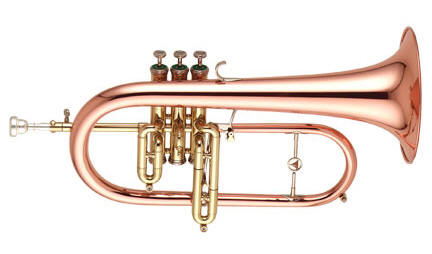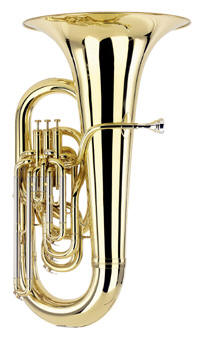|
The Instruments of the Band
| |

The Cornet
Often
confused with a trumpet, the cornet is the most numerous and
main melody instrument of a brass band. There are 2 types used
in a brass band, Eb and Bb. The Eb Cornet or Soprano Cornet has
the highest sound or "pitch" of any instrument in the band, and
often plays high solo parts over the main melody. A band
normally only uses one of these but may use nine or more Bb
Cornets. These Bb cornets cover a number of different parts: (i)
Solo Cornets plays most of the melody parts in the band (ii)The
2nds & 3rds may play in harmony or unison with the Solos, or
provide rhythms (iii) Repiano, the nomad of the section, lending
weight to other cornet parts when needed. |
| |
|
| |
|
| |
|

The Flugel Horn
The Flugel Horn, which looks a bit like an overgrown cornet, is
the link between the cornet and the horns. Like the cornet, it
is pitched in Bb, and may be used to support the cornet section
or horn section. However, because of its mellow tone, is more
and more used as a solo instrument especially in arrangements of
modern tunes. Outside brass bands it is used extensively in the
Jazz world. |
|
|
|

The Tenor Horn
The
Eb Horn, which looks like a small tuba, is only found in brass
bands. A member of the Saxhorn family of instruments, it
provides much of the "middle filling" of the band. Its role
tends to be rhythmic, but more and more is used as a solo
instrument, because of it's beautiful haunting tone. Bands tend
to use 3, covering the Solo, 1st and 2nd Horn parts, which
usually work in harmony with each other. |
|
|
|

The Baritone
The
Baritone, like the horn, is a member of the saxhorn family, and
occupies the middle of the band. It often works with the horns,
but also provides valuable support to the euphoniums when the
melody line moves towards the lower end of the band. A band will
use two, to cover 1st and 2nd Baritone parts. |
|
|
|

The Trombone
The
Trombone is the odd man out in the brass band. Whereas all the
other brass instruments use valves to get different notes, the
trombonist must use a slide. In brass bands they tend to provide
punch and drive to rhythms and melodies. A band will also use a
Bass Trombone which provides a link to the bass section. The
bass trombone is also the only instrument in the band that uses
the bass clef. The trombone is also widely used in jazz,
classical and popular music. |
|
|
|

The Euphonium
The
Euphonium is the second melody instrument in the band, valued
for its powerful, soulful tone. It's bigger than the baritone
and often comes with a fourth valve. Perhaps the busiest
instrument in the band, as well as melodies, it plays counter
melodies, doubles cornet melodies, rhythms or helps out the bass
section. |
|
|

The Bass
The Bass,
or Tuba as it is known outside bands, are the largest
instruments in the band. Bands use two different types, EEb (or
"double Eb") and BBb ("double" in this case means "really
big"!). The "engine room" of the band, the basses generally
provide the musical pulse of a piece and much of the incredible
rich tone brass bands are so famous for. They occasionally play
melody, although only the EEb tends to be used as a solo
instrument. It is also used widely in the classical and jazz
world. |
|
|
|

Percussion
The percussion section of a brass band is like a cross between a
rock band and an orchestra!
As well and the traditional bass drum and snare drum, bands
regularly use drum kits and cymbals. Many will also have tuned
percussion like timpani, which are large tunable drums, and
keyboard percussion instruments like glockenspiels and
xylophones.
Also used might be gongs, chimes, bongos, congas, all forms
of Latin percussion etc. Percussion sections are usually only
limited by the size of a band's bank balance!

 |
Copyright ?Dungarvan Brass Band 2008. All rights reserved. |

